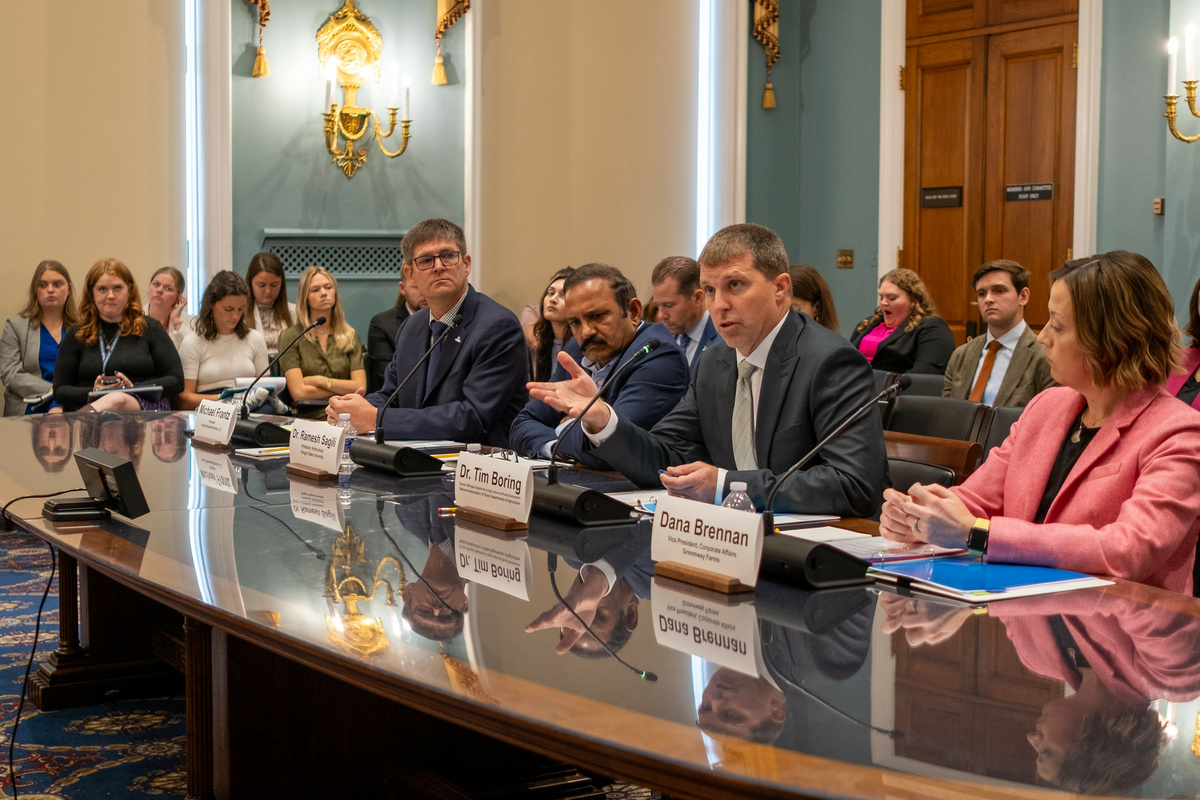
MDARD Director Talks State Budget, Cherry Industry, Tariff Impacts In Latest Leelanau Ticker Interview
By Craig Manning | Oct. 22, 2025
Tim Boring has been speaking up.
In September alone, Boring – executive director of the Michigan Department of Agriculture and Rural Development (MDARD) – blasted national tariff policies and their adverse effects on Michigan agriculture, decried a state budget proposal from Michigan’s House of Representatives that would have slashed MDARD’s budget, and testified before the U.S. House Committee on Agriculture (pictured) about the existential challenges facing specialty crop growers in Michigan.
In the wake of this flurry of activity, the Leelanau Ticker sat down with Boring to talk budget, tariffs, grants, cherries, and the promise of a new federal Farm Bill.
Ticker: You made a statement last month expressing concern about the House budget proposal and how it was going to cut a third of MDARD’s funding. How did things shake out for you in the final budget?
Boring: That initial House budget was pretty concerning for a lot of the services that MDARD delivers across the state. I think we're in pretty good shape here with the budget [that was ultimately passed]. Certainly, we're going to see some reductions in places across the department. But I think the important part is we're going to continue our ability to implement all those core activities that are so essential for business continuity and export facilitation, marketplace certainty, and just building on the quality of life for the people of Michigan.
Ticker: What were some areas that did get cut?
Boring: We’ve seen some minor funding reductions in some of our work around emergency management and in our qualified forest programming. I also think it's notable that we had the shift in some of our ongoing general fund to one-time funds, which means that we can continue this work into the next budget year, but we don't have funding certainty beyond that.
Ticker: What does the new budget mean for the grant programs that MDARD administers? We’ve talked before about the Farm to Family Program, which has funneled a lot of dollars to Leelanau County.
Boring: Those programs are going to continue. I think we've got a really good track record of leveraging modest state investments to spur economic opportunity. That Farm to Family program, specifically, is a response to what we've heard across the state – about how, with a little bit of more strategic thoughtfulness and some purposeful investments, we can really multiply the impacts of state dollars to further the entire region.
Across Michigan, we have far too many people that don't have the same kinds of economic opportunities they might have expected to have a generation ago. We have rural places where people aren't choosing to live anymore. You can see that in all kinds of numbers and anecdotal ways, from driving through small downtowns and seeing boarded-up businesses, to just looking at school enrollments and the fact that a lot of high schools are graduating fewer and fewer kids every year.
How can agriculture be a part of reversing those trends? Of being a positive contributor to small towns and rural economies? Of improving quality life and livability of places? We want to be showing up and making sure that the value of agriculture is seen more broadly, and some of that does become about how we build out these grant programs.
Ticker: When you see something like that House proposal come through, with really big, sweeping cuts, what’s the response inside MDARD?
Boring: Agriculture might be a little unique, because of the strength of so many of the relationships that we have. We've got good relationships with legislators in both chambers and both parties, and the department's been a frequent participant and contributor to a lot of committee hearings, just to walk through all the varied work that we do here in the department.
Those conversations are important, because our work includes a lot of stuff that folks might not always think about. It’s inspections of consumer services. We’re out at gas stations with a robust weights and measurement division, for instance. So, when we see a budget like that, it triggered a lot of conversations with industry partners about what the impacts might look like within the business community. And that includes things like the work that we do to issue phytosanitary certificates, which are required by companies that are importing our Michigan products. When a boxcar of black beans leaves Pigeon, Michigan, there are MDARD folks on hand certifying that load in accordance with what other governments are requiring to have as documentation. So, we worked to let industries know what these kinds of cuts would mean for them.
Ticker: How much are you keeping an eye on issues like the continued challenges of the northern Michigan cherry industry?
Boring: We’re closely attuned to the situations going on there, and really, we're seeing a lot of those same challenges in a lot of different Michigan crop systems.
With cherries, we know there are a lot of pressures on that industry. There’s development pressure on the land. There’s the labor availability challenge. There are concerns around how we're moving some of this product out of the country, but also with the kinds of products that are coming into the country and the threat of imports to our domestic market.
Because of all those factors, cherries are a bit of canary in the coal mine for agriculture in Michigan. As a result, that's a specific cropping system we're spending a lot of time understanding and talking about – not just because of what it means today for the Traverse City area, but also because it shows us what we might expect to see as similar dynamics impact blueberries and asparagus and a lot of other crops in the state that are similarly aligned.
Ticker: MDARD issued a report last month about tariff impacts, and it seems like Michigan is taking some pretty big hits in terms of exports. Fresh cherry exports were down 62 percent for the first half of 2025, compared to the same period last year. Fresh apple exports were down 58 percent. Wheat exports were down 89 percent. Can you comment on that situation, and any progress that's been made in lobbying the federal government about the damage these policies are doing?
Boring: I think there's certainly a growing awareness on the ramifications of our trade policy, and a lot of increasing pressure on the federal government, too. For our part, MDARD has highlighted a lot of what this lack of market access means for our farmers today, and what it what it promises to bring into the future.
Based on current trends, the impacts of retaliatory tariffs are pretty significant as well. For instance, I spent some time with some dry bean processors recently. What I heard is, when they're canning Michigan navy beans, the dramatic increase of raw material costs from things like steel and aluminum coming into the country are having a significant impact on the prices of their products on the supermarket shelves. Which, ultimately, is going to have a trickle-down effect.
So, there's a lot of different aspects to this. I think we're seeing more and more realization of that nationally, and we're going to continue to continue to advocate for a more coherent policy for how we approach trade and what our end goal is.
Ticker: The current version of the federal Farm Bill expired last month, and a new bill is in the works. What are some of things you'd like to see that would benefit Michigan?
Boring: In Michigan, we are seeing decreases in the diversity of our crop production. We're seeing challenges in how we implement resiliency, whether that's in supply chains or dealing with increasingly variable weather. I'd like to see a Farm Bill that prioritizes those kinds of things, and that is dynamic in bringing forward new ideas about how we prioritize food production in the United States.
I was in Washington recently, advocating for the continued funding for specialty crop block grants within the Farm Bill, around supporting our specialty crop industries. At the same time, I talked about some of the challenges we’re facing with cherries and other crops, trying to amplify at the federal level the fact that we need to be paying more attention to these types of crops.
Federally, corn and soybeans, those major row crops, command an awful lot of attention. And yes, we need to be thinking about soybeans and working on these market dynamics. But in a place like Michigan, you also have all these specialty crops that have not enjoyed the same type of federal attention, or even the establishment of robust safety net. Michigan’s cherry industry has faced some pretty significant yield challenges in the last couple years, but historically, specialty crops Michigan haven't seen the same kind of disaster relief as some of these bigger crops. For MDARD, it’s really important to continue pushing for expansions to some of those federal actions, to cover these crops like cherries that are culturally essential for a place like Michigan.
CommentMDARD Director Talks State Budget, Cherry Industry, Tariff Impacts In Latest Leelanau Ticker Interview
Tim Boring has been speaking up.
In September alone, Boring – executive director of the Michigan Department …
Read More >>The Latest Leelanau County Blotter & 911 Call Report
The Leelanau Ticker is back with a look at the most alarming, offbeat, or otherwise newsworthy calls …
Read More >>How Will Michigan’s Aggressive New Marijuana Tax Impact Leelanau’s Lone Cannabis Dispensary?
Michigan’s marijuana industry is about to get hit with a brand-new tax – one that industry leaders …
Read More >>Former American Idol Contestant With Leelanau Ties Signs Major Label Recording Contract
Slater Nalley has a record deal.
According to a report published Friday by Nashville’s Music Row magazine …
Read More >>



